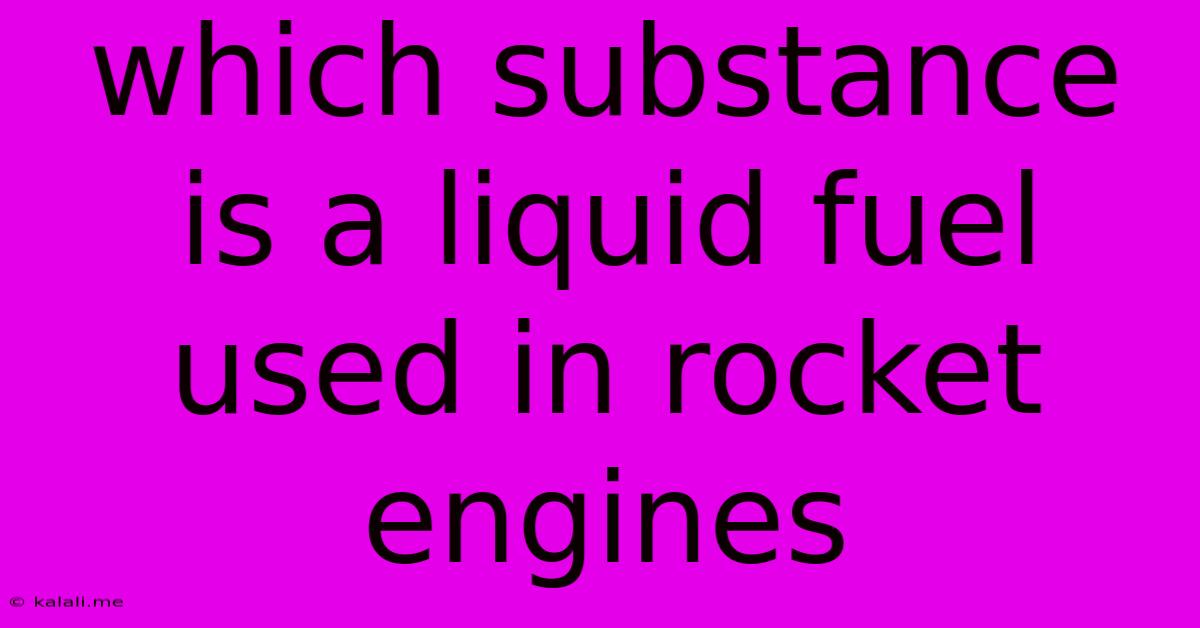Which Substance Is A Liquid Fuel Used In Rocket Engines
Kalali
Jun 15, 2025 · 3 min read

Table of Contents
Which Substance is a Liquid Fuel Used in Rocket Engines?
Rocket engines, the powerful driving force behind space exploration, rely on a variety of propellants for their incredible thrust. While solid propellants exist, this article focuses on the liquid fuels that power many rockets, exploring their properties and applications. Understanding these fuels is crucial for comprehending the complexities of rocket science and space travel.
The Leading Liquid Rocket Fuels: A Deep Dive
Several substances serve as liquid fuels in rocket engines, each with its own advantages and disadvantages regarding performance, cost, and safety. The choice often depends on the specific mission requirements and technological capabilities.
1. Kerosene (RP-1): A widely used and relatively inexpensive fuel, kerosene (refined petroleum) is known for its high energy density and good storage stability. It's a relatively mature technology, meaning its properties are well-understood and reliable. The SpaceX Falcon 9 and Russia's Soyuz rockets are prime examples of vehicles utilizing kerosene as their fuel. This makes kerosene a workhorse in the field of liquid rocket propulsion.
2. Liquid Hydrogen (LH2): Liquid hydrogen boasts the highest specific impulse (a measure of fuel efficiency) of any commonly used rocket propellant. This means it produces more thrust per unit of propellant mass. However, it has a very low density, requiring large storage tanks, and it’s extremely cryogenic, needing specialized, well-insulated storage and handling to prevent rapid vaporization. The Space Shuttle’s main engines and the Saturn V rocket, which launched the Apollo missions, used liquid hydrogen.
3. Liquid Methane (CH4): Emerging as a strong contender, liquid methane offers a good balance between performance and practicality. It possesses a higher specific impulse than kerosene and is significantly easier to store and handle than liquid hydrogen, being less cryogenic. Methane is also considered a relatively clean-burning fuel, producing less pollution compared to kerosene. SpaceX's Starship is a prominent example of a rocket utilizing liquid methane. Its ease of production on other planets is also a strong argument for its future use in space exploration.
4. Other Liquid Fuels: While less common, other substances find niche applications as liquid rocket fuels. These include:
- Hydrazine (N2H4): A hypergolic fuel, meaning it ignites spontaneously on contact with an oxidizer, often used in smaller rocket engines and satellite maneuvering systems. Its toxicity, however, necessitates careful handling.
- RP-2: A higher boiling point form of kerosene.
Choosing the Right Fuel: A Balancing Act
The selection of a liquid fuel for a rocket engine is a multifaceted decision based on several key factors:
- Specific Impulse (Isp): A higher Isp means more efficient use of propellant, leading to greater payload capacity.
- Density: A higher density means smaller tanks, reducing overall weight.
- Cryogenic Properties: The ease of storage and handling directly impacts the complexity and cost of the rocket system.
- Toxicity and Environmental Impact: Safety considerations and environmental regulations significantly influence fuel choice.
- Cost: Fuel production and handling costs are vital economic factors.
In conclusion, choosing the "best" liquid fuel is context-dependent. While liquid hydrogen offers superior performance, the practical challenges associated with its cryogenic nature often outweigh its advantages for many missions. Kerosene remains a reliable and cost-effective choice, while liquid methane emerges as a promising alternative, offering a better balance between performance and practicality. The future of liquid rocket propulsion may well depend on continued advancements in methane-based technologies and the development of even more efficient and sustainable propellants.
Latest Posts
Latest Posts
-
Arrange The Following In The Correct Sequence
Jun 15, 2025
-
What Are All The Factors Of 81
Jun 15, 2025
-
Which Of The Following Is Not A Parameter
Jun 15, 2025
-
Who Is The Father Of Humanism
Jun 15, 2025
-
An Alpha Particle Is The Same As A
Jun 15, 2025
Related Post
Thank you for visiting our website which covers about Which Substance Is A Liquid Fuel Used In Rocket Engines . We hope the information provided has been useful to you. Feel free to contact us if you have any questions or need further assistance. See you next time and don't miss to bookmark.